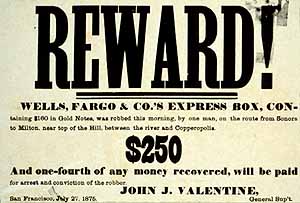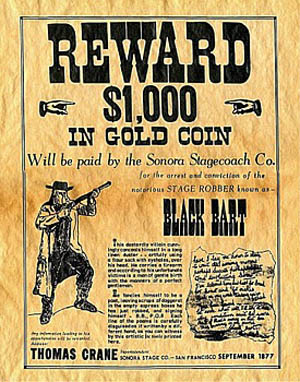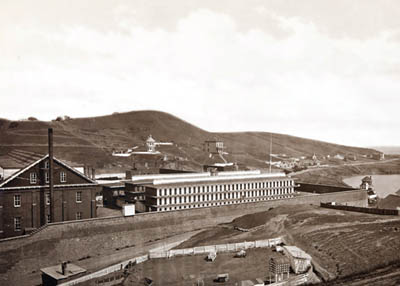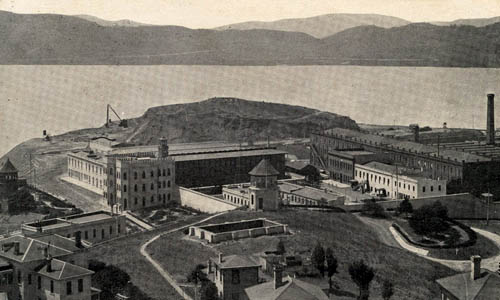
California's Infamous Stage Robber
PRISON

 On Wednesday, November
21, 1883, Black Bart began serving his six year sentence at San Quentin
Prison. It had only been 18 days since that last fateful robbery at
Funk Hill. He was logged in as Charles E. Bolton and officially known
as Number 11046. He denied being Black Bart or Charles E. Boles. Some
think the reason he insisted on keeping the Bolton name was in some way
to protect the family that he had so long ago deserted. However, during
his stay in San Quentin he did send and receive letters from his wife,
Mary Boles, and other family members. For the most part his letters were
warm and friendly.
On Wednesday, November
21, 1883, Black Bart began serving his six year sentence at San Quentin
Prison. It had only been 18 days since that last fateful robbery at
Funk Hill. He was logged in as Charles E. Bolton and officially known
as Number 11046. He denied being Black Bart or Charles E. Boles. Some
think the reason he insisted on keeping the Bolton name was in some way
to protect the family that he had so long ago deserted. However, during
his stay in San Quentin he did send and receive letters from his wife,
Mary Boles, and other family members. For the most part his letters were
warm and friendly.
During most of his stay at San Quentin Bart worked as a clerk or
bookkeeper in the prison hospital. His work in the dispensary of the
prison had gained the respect of the physician, Doctor Rich, and
apothecary, Fred Fuller. By close attendance to his duties Bart had
become sufficiently acquainted with the art of compounding
prescriptions to enable him to take a position in a drug store. When
asked, Bart said he might settle down somewhere after his release as a
drug clerk. While in prison Bart did not have many associations with
prisoners, feeling himself superior to other convicts. He did, however,
have one unlikely close friend, Charles E. Dorsey. Dorsey was a
cold-blooded murder and robber. One wonders what they had in common.
While Bart was in prison there was no record of him having any
visitors. However, there were many stories and rumors of the people
that had visited him. There was one interesting story from a family
member, saying the information came from one of Bart's letters to his
wife. It suggested that a very wealthy man had become interested in
him and may have been instrumental in his early release.
On January 21, 1888, after serving four years and two month of a six
year sentence, Black Bart walked out of San Quentin prison a free man.
It was said that his early release was because of the "Goodwin
Act" that allowed prisoners time off for good behavior. Even
though he had been in prison for over four years, the press was still
interested in a new Black Bart story, and they were there to greet him
when he was released. The press bombarded him with questions. He said
his name was Charles Bolton and that is what he wanted to be called. He
said he was older now and could feel the added years, not that prison
life had hurt him, for he was still in good health. He added he was
becoming a bit deaf now and needed glasses for reading. One reporter
asked if he would go back to robbing stage coaches; Bart said he was
through with crime. Another reporter asked if he would write any more
poems? Bart turned to him and said, "Young man didn't you hear me
say I would commit no more crimes?"

San Quentin Prison - Circa 1874
Courtesy California History Room, California State Libary, Sacramento, CA
After his release from San Quentin Bart went back to San
Francisco and took a room at the Nevada House located at 132 Sixth
Street. Rembering their moto "Wells Fargo Never Forgets," Wells Fargo kept close track of him.
Bart kept to himself and did not have contact with any of his former friends or
acquaintances. One interesting thing: a newspaper ad appeared in the
"Personals" on January 23, 1888, two days after Bart was
released. It was printed only once and read "Black Bart will hear
something to his advantage by sending his address to M.R. Box 29, this
office." Was it someone wanting to offer him a job or maybe get information from
him too write a book? Some even suggesed it was Mary Vollmer, his supposed mistress.
No one knows if Bart saw the ad or responded to it.
Whoever placed the ad still remains a mystery.
Bart never returned to his wife, Mary, in Hannibal, Missouri. However,
he did write to her after his release. In one of the letters he said he
was tired of being shadowed by Wells Fargo, felt demoralized, and wanted to
get away from everybody. In February, 1888 Bart decided it was time to act.
He left the Nevada House
and vanished. Hume said Wells Fargo tracked him to the Palace Hotel1 in
Visalia. The owner said a man answering the description of Bart checked
in and then disappeared. He left a valise in the room. It contained a
can of corned beef, a can of tongue, a pound of coffee, packages of
crackers and sugar, a jar of jelly, two neckties and two pairs of cuffs
bearing the laundry mark F.X.O.7. Was this Bart's way of getting back
at Hume, was it to confound Wells Fargo, or was it just to leave a false
trail? Whatever the reason, the last time anyone saw Black Bart was
February 28, 18882.
In 1892 Mary Boles listed herself in the city directory as the widow of
Charles E. Boles. She may have known more than she was telling, but then
again she may have just given up and done it to get on with her life3.
1 Local Historians in Visalia, CA dispute which
hotel Bart stayed in at Visalia. Local historians claim that Bart actually stayed at the Visalia House Hotel.
The two hotels were a block apart on Visalia's Main St. The Palace Hotel building still exists. The Visalia
House was torn down in 1917.
2 Recently a book named "Black Bart The Search Is Over" by Robert
Jernigan and Wiley Joiner was published. In their book they say that Bart wound up in Marysville California and
worked as a druggist named Charles Wells until his death on December 16, 1914. He was buried in the City Cemetery
in a grave marked by a small stone numbered 743. The book is very interesting and well written. However, there
are no actual documented facts identifying Bart. The conclusions are based on circumstantial evidence and
hearsay. The only way to actually prove that this is Bart is to exhume the body and verify the DNA with one of his living
relatives.
There are many stories on what happened to Bart. For example, I have a very long description from
a family in Texas that talks about their great-great grandfather. He came to Texas as an old man and purchased a
small farm (ranch). After he was settled he married a young woman. I believe she was 18 or 19 (not bad for a 60
year old man). They had several children. Before he died he told his wife and children that he had come to Texas
to escape from his former life as Black Bart. The only problem I had with their story was their description of
Bart. It was not what I expected. However, he was an old man and people change as they age. The Texas family
has the same problem as the Marysville druggist, no documented evidence. However, the Texas family does have
one easy recourse if they choose to use it. They say they are living relatives of Bart so they could
compare their DNA against one of the living relatives of the Charles Boles family.
3 Supposedly In 1917, a New York newspaper printed an obituary for a Charles
E. Boles, a Civil War veteran. If this was Bart, he would have been 88 years old.
I will end this section with a quote from the Prologue of the book
BLACK BART: THE POET BANDIT.
January 21, 1888
Charles stepped out into the foggy morning and sighed. He knew there'd be a crowd, and he wasn't disappointed.
Reporters, in dark suits and heavy coats, were awaiting his appearance.
"Mr. Bolton," called one, raising his pencil, "how does it feel to be a free man?"
Charles took a long, deep breath. "I can't beieving?"
Charles smiled as he looked around at the blur of eager faces. "Oh, I'm done with Black Bart and my life of crime.
For one thing, I've grown a bit deaf and need spectacles. That would present a bit of a problem for a stage bandit,
don't you think?"
The men in dark suits laughed.
A second reporter stepped forward. "But what of your literary efforts, Mr. Bolton? Are you through writing poetry?
You know, our readers enjoyed the verse."
A ripple of good-hearted cheers passed through the crowd.
Charles tapped the brim of the bowler he'd been given by the warden just this morning. "If I managed a bit of
a rhyme," he said, tilting his chin, "like, as not, it might add to my time. It's better left dead, buried alive,
filled with lead, but I thank ye for asking, my fine friend."
A round of applause erupted before Charles could continue. "Like I said, sir, I'm done with my life of crime."
"And what about Mr. Hume? Has Wells, Fargo & Company given you any advice?"
"I would hope Mr. Hume is satisfied that justice was served," said Charles. In truth, the Wells, Fargo &
Company detective had avoided contact with him since his incarceration at San Quentin, but Charles knew
the man was following his every move. No doubt he'd been disappointed when Charles was given an early release.
"You've not served your full sentence, and it's been said that Mr. Hume is apoplectic over this turn of events.
He says it's a foolhardy gesture."
"Gentlemen," interrupted Charles, "I served my time and did so with no complaints. How can Mr. Hume be anything
but satisfied? I'm satisfied," he added, winking at a man near him.
"Here, here!" responded the man warmly.
Suddenly another journalist at the back of the crowd spoke up. "I do believe he questions your contrite heart, Mr.
Bolton. After all, you did manage to fool him twenty-eight times. Perhaps even more than that, if all were told?"
Charles tried to capture the man's glance. "I was able to keep Wells, Fargo & Company rather busy, wasn't I?"
Those nearest him smiled and nodded.
"But you're not repentant?" came the immediate reply from the back.
"Oh, I have much to repent, as do we all," Charles said, his steady gaze on the reporter who had finally moved
into his line of vision. He was handsome, young, and eager. "In fact, I would suggest," he added, "that when
you take the measure of a man, sir, be sure to take the full measure."
"Very well. Does that mean there is something you'd like to add to your story? Our readers are anxious to know
what you are about. Why you chose to rob only Wells, Fargo & Company, for instance."
Charles grimaced as he considered the question. Tell all?
No, he'd not give these men, or anyone, such satisfaction. "May I get back to you?" He faced the rest of the crowd.
"For now, I just want a beef steak and a glass of ale."
"Indeed," returned another man.
Just then a coach pulled up.
The crowd fell back and gave Charles clear passage even as they scribbled across their notepads. He moved past
them, nodding to those closest.
"Good luck, Mr. Bolton."
Charles stopped.
The earnest young journalist had moved to the end of the line of dark suits and his gaze was clear and focused.
"Remember, sir, I'd appreciate your story in full, if you ever have a mind to share it. I work for the San Francisco
Examiner," he added, "and the name's Randolph Hearst."

San Quentin Prison - Circa 1917
Courtesy California History Room, California State Libary, Sacramento, CA
Home | Why Bart | Legend Begins | C.E. Boles | Legend Ends | Prison | Robberies | Family Tree | Trivia | Plaque | ????
Want to contact us? E-mail the Webmaster